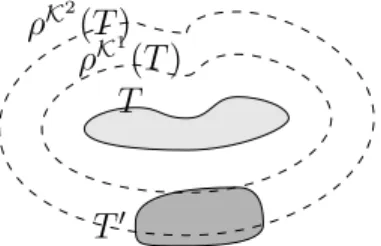Belief revision, minimal change and relaxation: A general framework based on satisfaction systems, and applications to description logics
Texte intégral
Figure


Documents relatifs
It was recently shown that in the logic G - IALC under witnessed model semantics, all standard reasoning problems can be solved in ex- ponential time, matching the complexity
Ceylan, ˙I.˙I., Pe˜ naloza, R.: Reasoning in the Description Logic BEL using Bayesian Networks.. Cook, S.A.: The complexity of
We have defined a rational closure construction for the Description Logic ALC extended with a typicality operator and provided a minimal model semantics for it based on the idea
General Concept Inclusion (GCIs) absorption algorithms have shown to play an important role in classical Description Logics (DLs) reasoners, as they allow to transform GCIs into
In Section 2 we introduce the general framework of DL Based Dynamic Systems, and in Section 3, the verification formalism, based on first-order µ-calculus with a controlled form
Our main goal with this project is to propose postulates, constructions, theorems and algorithms that make it possible to perform operations of Multiple Belief Revision, especially
Ontologies are engineering artifacts used to this purpose, and Description Logics (DLs) are a family of logic-based languages par- ticularly suitable for modeling (and reasoning
Having many nice features, the WFS is defined for all normal programs (i.e., logic programs with the possibility of negation in rule bodies), has a polynomial data